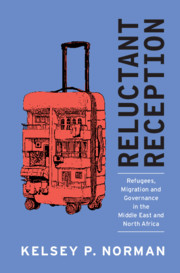Book contents
- Reluctant Reception
- Reluctant Reception
- Copyright page
- Dedication
- Epigraph
- Contents
- Figures
- Tables
- Acronyms
- Note on Translation
- Preface
- 1 Introduction
- 2 Host State Engagement in the Middle East and North Africa
- 3 Egypt
- 4 Morocco
- 5 Turkey
- 6 Differential Treatment by Nationality?
- 7 The Domestic Influence of International Actors
- 8 The Post-2015 Migration Paradigm in the Mediterranean
- 9 Conclusion and Avenues Forward
- Book part
- Notes
- References
- Index
9 - Conclusion and Avenues Forward
Published online by Cambridge University Press: 26 November 2020
- Reluctant Reception
- Reluctant Reception
- Copyright page
- Dedication
- Epigraph
- Contents
- Figures
- Tables
- Acronyms
- Note on Translation
- Preface
- 1 Introduction
- 2 Host State Engagement in the Middle East and North Africa
- 3 Egypt
- 4 Morocco
- 5 Turkey
- 6 Differential Treatment by Nationality?
- 7 The Domestic Influence of International Actors
- 8 The Post-2015 Migration Paradigm in the Mediterranean
- 9 Conclusion and Avenues Forward
- Book part
- Notes
- References
- Index
Summary
Chapter 9 revisits the central argument of this book: that we can better understand the migrant and refugee engagement strategies of host states if we account for indifference as a policy option, in addition to liberal or repressive policies. Identifying indifference—and considering the possibility that it is a strategic option utilized by host states, rather than the absence of state capacity—helps elucidate approaches that might otherwise be considered neglect or an absence of engagement. Chapter 9 also considers the generalizability of this study and its potential applicability to other regions such as South America or Asia where states are undergoing a similar transformation from countries of conduit to countries of settlement. Finally, the chapter considers the policy implications of this book. Taking the incentives of MENA states more seriously and finding ways to give them a meaningful and equitable seat at the table while still ensuring that they are abiding by international standards and upholding migrant and refugee rights is undoubtedly a challenging task. Yet only in doing so can we develop a more just and effective migrant and refugee protection system that addresses the well-being of migrants, refugees, and host country nationals at present and in the future.
- Type
- Chapter
- Information
- Reluctant ReceptionRefugees, Migration and Governance in the Middle East and North Africa, pp. 188 - 201Publisher: Cambridge University PressPrint publication year: 2020

